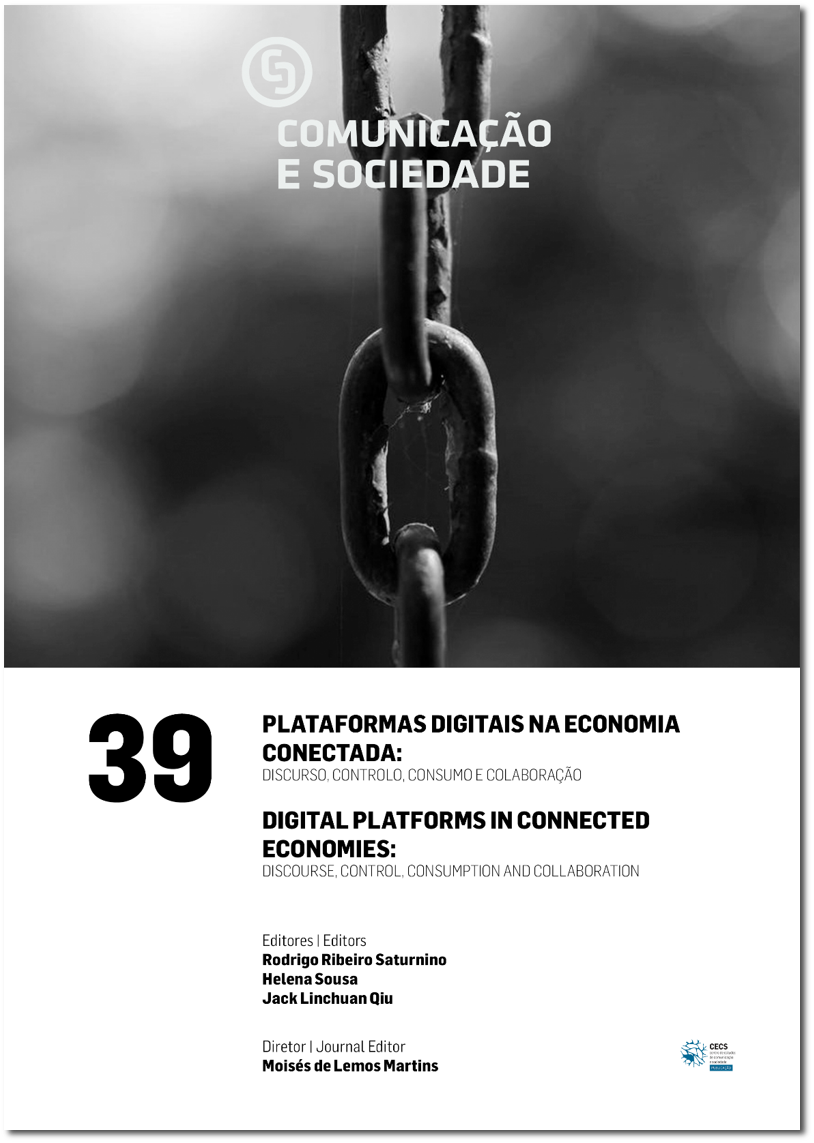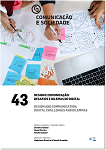Journalism in Time of Pandemic: New Professional Routines, New Ethical Challenges
DOI:
https://doi.org/10.17231/comsoc.39(2021).3176Keywords:
deontology, news sources, newsroom, professional routines, teleworkingAbstract
The covid-19 pandemic and the subsequent process of confinement led to lines of convulsion in different sectors of society. Marked by a context of instability and uncertainty, where different manifestations of technological, economic and social transformation enhance new practices and conventions, as well as raising new and renewed deontological challenges, journalism is no exception. Based on the responses of a survey answered by 890 Portuguese journalists, this article seeks to map the effects of the March–April 2020 state of emergency on practices and routines, and on the ethical-professional precepts of an activity that calls for a revived relevance in an environment of disinformation and “infodemic”. More than revealing new problems, the results obtained suggest the intensification of the pre-existing challenges and dilemmas. In terms of practices, it is indicated that the activity is relatively domiciled. This phenomenon is accompanied by marks of depersonalization of contact with sources and events, and by signs of social isolation from journalists. In the ethical-deontological field, the emergence of particular deontological issues in the context of the pandemic, where aspects related to rigour — rejection of sensationalism, a clear distinction between facts and opinion or repudiation of any form of censorship — as well as to subsequent elements underlying contact with the sources, take on a special dimension.
Downloads
References
Abidi, A. (2020, 22 de abril). Journalism ethics expert on coronavirus crisis: “This is a human story above all”. European Journalism Observatory. https://en.ejo.ch/ethics-quality/journalism-ethics-expert-on-coronavirus-crisis-this-is-a-human-story-above-all
Arntz, M., Yahmed, S. B., & Berlingieri, F. (2020). Working from home and covid-19: The chances and risks for gender gaps. ZEW. https://www.zew.de/fileadmin/FTP/ZEWKurzexpertisen/EN/ZEW_Shortreport2009.pdf
Berkowitz, D. (2019). A sociological perspective on the reporter-source relationship. In K. Wahl-Jorgensen, & T. Hanitzsch (Eds.), The handbook of journalism studies (pp. 165–179). Routledge.
Bernadas, J. M. A. C., & Ilagan, K. (2020). Journalism, public health, and covid-19: Some preliminary insights from the Philippines. Media International Australia, 177(1), 132–138. https://doi.org/10.1177/1329878X20953854
Bibby, A. (2014). Employment relationships in the media industry (Working paper No. 295). International Labour Organization. http://www.andrewbibby.com/pdf/wcms_249912.pdf
Brennen, J. S., Simon, F., Howard, P. N., & Nielsen, R. K. (2020, 7 de abril). Types, sources, and claims of covid-19 misinformation. Reuters Institute. https://reutersinstitute.politics.ox.ac.uk/types-sources-and-claims-covid-19-misinformation
Camponez, C. (2011). Deontologia do jornalismo. Almedina.
Camponez, C., & Christofoletti, R. (2019). Reinventando pactos globais para a ética da comunicação e do jornalismo. Mediapolis, 9, 5–12. https://doi.org/10.14195/2183-6019_9_0
Camponez, C., & Oliveira, M. (2021). Jornalismo em contexto de crise sanitária: Representações da profissão e expectativas dos jornalistas. Comunicação e Sociedade, 39, 251–267. https://doi.org/10.17231/comsoc.39(2021).3178
Cardoso, G., Baldi, V., Quintanilha, T. L., Paisana, M., & Pais, P. C. (2020). Impacto do branding e conteúdos patrocinados no jornalismo. OberCom. https://obercom.pt/wp-content/uploads/2020/02/Sponsored_content_FINAL_edit_Spain_UK.pdf
Carlson, M. (2016). Metajournalistic discourse and the meanings of journalism: Definitional control, boundary work, and legitimation. Communication Theory, 26(4), 349–368. https://doi.org/10.1111/comt.12088
Carlson, M., & Lewis, S. (Eds.). (2015). Boundaries of journalism – Professionalism, practices and participation. Routledge.
Chowdhury, M. A. (2020, 10 de março). Tips for journalists covering covid-19. Global Investigative Journalism Network. https://gijn.org/2020/03/10/tips-for-journalists-covering-covid-19/
Christians, C. G., Fackler, M., Richardson, K. B., Kreshel, P. J., & Woods, R. H., Jr. (2020). Media ethics: Cases and moral reasoning. Routledge.
Christofoletti, R. (2014). Preocupações éticas no jornalismo feito por não-jornalistas. Comunicação e Sociedade, 25, 267–277. https://doi.org/10.17231/comsoc.25(2014).1873
Coddington, M., & Lewis, S. (2020, 7 de outubro). What work is required to build public trust in news? RQ1. https://rq1.substack.com/p/the-emergence-of-a-new-kind-of-journalistic
Cohen, N. S. (2019). At work in the digital newsroom. Digital Journalism, 7(5), 571–591. https://doi.org/10.1080/21670811.2017.1419821
Cotter, C. (2010). News talk: Investigating the language of journalism. Cambridge University Press.
Dart Center. (2020, 28 de fevereiro). Covering coronavirus: Resources for journalists. Dart Center for Journalism & Trauma. https://dartcenter.org/resources/covering-coronavirus-resources-journalists
Deuze, M. (2010). Managing media work. Sage.
Deuze, M., & Witschge, T. (2020). Beyond journalism. Cambridge Polity Press.
Donsbach, W. (2010). Journalists and their professional identities. In S. Allan (Ed.), The Routledge companion to news and journalism (pp. 38–48). Routledge.
Fenton, N. (2010). News in the digital age. In S. Allan (Ed.), The Routledge Companion to news and journalism (pp. 557–567). Routledge.
Fenton, N. (2019). Dis(trust). Journalism, 20(1), 36–39. https://doi.org/10.1177/1464884918807068
Fidalgo, J. (2009). O lugar da ética e da auto-regulação na identidade profissional dos jornalistas. Fundação Calouste Gulbenkian; Fundação para a Ciência e a Tecnologia.
Fidalgo, J. (2016). Disputas nas fronteiras do jornalismo. In T. Gonçalves (Ed.), Digital media Portugal – ERC 2015 (pp. 35–48). ERC – Entidade Reguladora para a Comunicação Social. https://www.erc.pt/pt/estudos-e-publicacoes/novos-media/estudo-digital-media-portugal-2015
Fink, K. (2019). The biggest challenge facing journalism: A lack of trust. Journalism, 20(1) 40–43. https://doi.org/10.1177/1464884918807069
Friend, S., & Singer, J. (2007). Online journalism ethics – Traditions and transitions. M. E. Sharpe.
Garcia. J. L., Matos, J. N., & Silva, P. A. (2021). Jornalismo em estado de emergência: Uma análise dos efeitos da pandemia covid-19 nas relações de emprego dos jornalistas. Comunicação e Sociedade, 39, 269–285. https://doi.org/10.17231/comsoc.39(2021).3177
Hanitzsch, T., Van Dalen, A., & Steindl, N. (2017). Caught in the nexus: A comparative and longitudinal analysis of public trust in the press. The International Journal of Press/Politics, 23(1), 3–23. https://doi.org/10.1177/1940161217740695
Ibarra, H., Gillard, J., & Chamorro-Premuzic, T. (2020, 16 de julho). Why WFH isn’t necessarily good for women. Harvard Business Review. https://hbr.org/2020/07/why-wfh-isnt-necessarily-good-for-women
Ikonen, P., Luoma-aho, V., & Bowen, S. A. (2017). Transparency for sponsored content: Analysing codes of ethics in public relations, marketing, advertising and journalism. International Journal of Strategic Communication, 11(2), 165–178. https://doi.org/10.1080/1553118X.2016.1252917
International Federation of Journalists. (2020, 23 de julho). Covid-19 has increased gender inequalities in the media, IFJ survey finds [Press release]. https://www.ifj.org/media-centre/news/detail/category/press-releases/article/covid-19-has-increased-gender-inequalities-in-the-media-ifj-survey-finds.html
Kovach, B., & Rosenstiel, T. (2014). The elements of journalism: What newspeople should know and the public should expect. Random House.
Le Cam, F., Libert, M., & Domingo, D. (2020, junho). Journalisme en confinement. Enquête sur les conditions d’emploi et de travail des journalistes belges francophones. Les Carnets du LaPIJ, 1. https://www.ifj.org/actions/ifj-campaigns/decent-work-day-2020-telework.html?tx_wbresources_list%5Bresource%5D=565&cHash=1c76658a1ac01146cfeaa9e1c4b30e2a
Lewis, S., & Westlund, O. (2016). Mapping the human-machine divide in journalism. In T. Witschge, C. Anderson, D. Domingo, & A. Hermida (Eds.), The Sage handbook of digital journalism (pp. 341–353). Sage. https://doi.org/10.4135/9781473957909.n23
Martins, P. (2019). O rigor como eixo central da atividade jornalística. Mediapolis, 9, 41–55. https://doi.org/10.14195/2183-6019_9_3
Mateus, S. (2019). New media, new deontology – Ethical constraints of online journalism. Mediapolis 9, 13–26. https://orcid.org/0000-0002-1034-6449
Mathisen, B. (2019). Ethical boundaries among freelance journalists. Journalism Practice, 13(6), 639–656. https://doi.org/10.1080/17512786.2018.1548301
McBride, K., & Rosenstiel, T. (Eds.). (2014). The new ethics of journalism – Principles for the 21st century. Sage.
Meyers, C. (Ed.). (2010). Journalism ethics – A philosophical approach. Oxford University Press.
Miranda, J. (2019). O papel dos jornalistas na regulação da informação: Caraterização socioprofissional, accountability e modelos de regulação em Portugal e na Europa [Tese de doutoramento, Universidade de Coimbra]. Estudo Geral. https://estudogeral.sib.uc.pt/handle/10316/87571
Nölleke, D., Maares, P., & Hanusch, F. (2020). Illusio and disillusionment: Expectations met or disappointed among young journalists. Journalism, 1–17. Publicação eletrónica antecipada. https://doi.org/10.1177/1464884920956820
objETHOS. (2020). Guia de cobertura ética da covid-19. https://objethos.files.wordpress.com/2020/07/guia_covid_objethos.pdf
Örnebring, H. (2019). Journalism cannot solve journalism’s problems. Journalism, 20(1), 226–228. https://doi.org/10.1177/1464884918808690
Pacheco, L., & Freitas, H. S. (2014). Poucas expectativas, algumas desistências e muitas incertezas. In J. Rebelo (Ed.), As novas gerações de jornalistas portugueses (pp. 21–36). Editora Mundos Sociais.
Parks, P. (2019). Toward a humanistic turn for a more ethical journalism. Journalism, 21(9), 1229–1245. https://doi.org/10.1177/1464884919894778
Pickard, V. (2019). The violence of the market. Journalism, 20(1), 154–158. https://doi.org/10.1177/1464884918808955
Plaisance, P. (2009). Media ethics – Key principles for responsible practice. Sage.
Power, K. (2020). The covid-19 pandemic has increased the care burden of women and families. Sustainability: Science, Practice and Policy, 16(1), 67–73. https://doi.org/10.1080/15487733.2020.1776561
Reinardy, S. (2011). Newspaper journalism in crisis: Burnout on the rise, eroding young journalists’ career commitment. Journalism, 12(1), 33–50. https://doi.org/10.1177/1464884910385188
Riordan, K. (2014). Accuracy, independence, and impartiality: How legacy media and digital natives approach standards in the digital age. Reuters Institute Fellow’s Paper. https://reutersinstitute.politics.ox.ac.uk/our-research/accuracy-independence-and-impartiality-how-legacy-media-and-digital-natives-approach
Ryfe, D. (2019). The ontology of journalism. Journalism 2019, 20(1), 206–209. https://doi.org/10.1177/8756087918809246
Siapera, E., & Veglis, A. (2012). Introduction: The evolution of online journalism. In E. Siapera & A. Veglis (Eds.), The handbook of global online journalism (pp. 1–17). John Wiley & Sons.
Singer, J. (2014). Sem medo do futuro: Ética do jornalismo, inovação e um apelo à flexibilidade. Comunicação e Sociedade, 25, 49–66. https://doi.org/10.17231/comsoc.25(2014).1858
Stănescu, G. (2020). The importance and role of the journalist during covid-19. Lessons learned from home journalism. In D. V. Voinea, & A. Strungă (Eds.), Research terminals in the Social Sciences (pp. 105–114). SITECH Publishing House.
Tong, J. (2017). Introduction: Digital technology and journalism – An international comparative perspective. In J. Tong, & S. H. Lo (Eds.), Digital technology and journalism (pp. 1–21). Palgrave Macmillan.
Unesco. (2020). Combate à desinfodemia: Trabalhar pela verdade em tempos de covid-19. https://pt.unesco.org/covid19/disinfodemic
Usher, N. (2018). Re-thinking trust in the news – A material approach through ‘objects of journalism’. Journalism Studies, 19(4), 564–578. https://doi.org/10.1080/1461670X.2017.1375391
Waisbord, S. (2019). The vulnerabilities of journalism. Journalism, 20(1), 210–213. https://doi.org/10.1177/1464884918809283
Ward, S. (Ed.). (2013). Global media ethics: Problems and perspectives. Wiley-Blackwell.
Ward, S. (2016). Digital journalism. In B. Franklin, & S. Eldridge (Eds.), The Routledge companion to digital journalism studies. Routledge. https:// doi.org/10.4324/9781315713793-4
Ward, S. (2018). Reconstructing journalism ethics: Disrupt, invent, collaborate. Media & Jornalismo, 18(32), 9–17. https://doi.org/10.14195/2183-5462_32_1
White, A. (2014, 30 de setembro). Why ethical journalism needs a magna carta for the web. Ethical Journalism Network. https://ethicaljournalismnetwork.org/why-ethical-journalism-needs-a-magna-carta-for-the-web
Wilkins, L., & Christians, C. (Eds.). (2009). The handbook of mass media ethics. Routledge.
World Health Organisation. (2020, 25 de agosto). Immunizing the public against misinformation. https://www.who.int/news-room/feature-stories/detail/immunizing-the-public-against-misinformation
Zelizer, B. (2019). Why journalism is about more than digital technology. Digital Journalism, 7(3), 343–350. https://doi.org/10.1080/21670811.2019.1571932
Downloads
Published
How to Cite
Issue
Section
License
Copyright (c) 2021 Comunicação e Sociedade

This work is licensed under a Creative Commons Attribution-NonCommercial 4.0 International License.
Authors own the copyright, providing the journal with the right of first publication. The work is licensed under a Creative Commons Attribution 4.0 International License.














